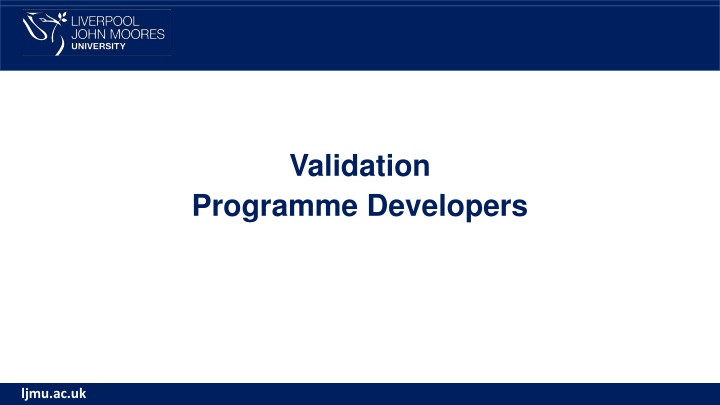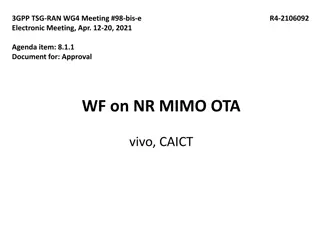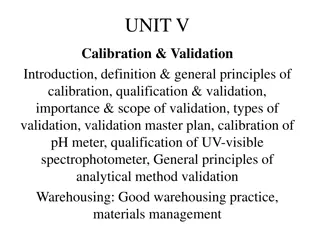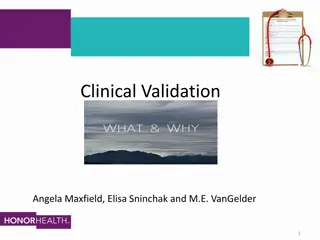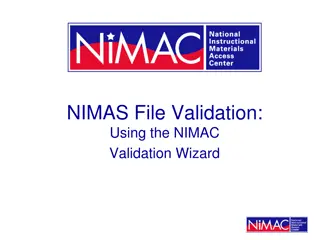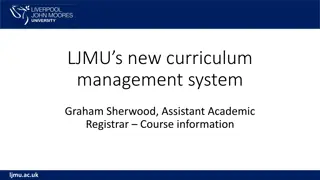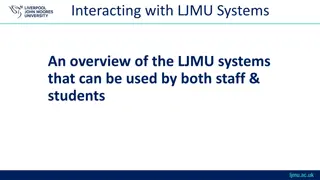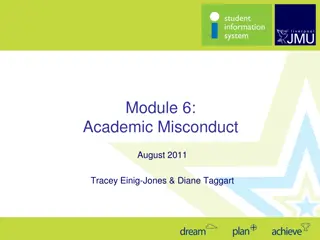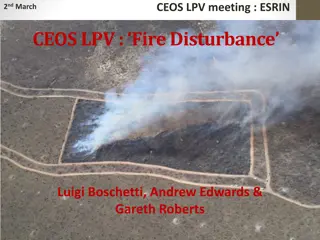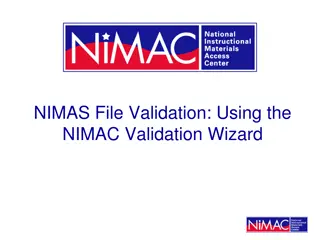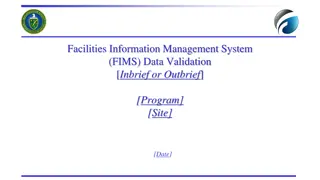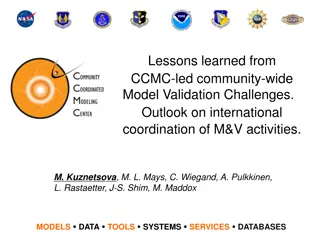Validation Programme Developers at LJMU
This session covers the validation process, documentation requirements, and national quality expectations according to the UK Quality Code for Higher Education. It explains the scrutiny process for new programs of study to ensure they meet University and national standards. Additionally, it highlights core practices and expectations for maintaining academic quality and standards in higher education.
Download Presentation

Please find below an Image/Link to download the presentation.
The content on the website is provided AS IS for your information and personal use only. It may not be sold, licensed, or shared on other websites without obtaining consent from the author.If you encounter any issues during the download, it is possible that the publisher has removed the file from their server.
You are allowed to download the files provided on this website for personal or commercial use, subject to the condition that they are used lawfully. All files are the property of their respective owners.
The content on the website is provided AS IS for your information and personal use only. It may not be sold, licensed, or shared on other websites without obtaining consent from the author.
E N D
Presentation Transcript
Validation Programme Developers ljmu.ac.uk ljmu.ac.uk
What this session will cover The validation process. Documentation requirements. The national quality expectations (UK Quality Code for Higher Education) and benchmarks for programme design and approval. Sources of information and guidance. ljmu.ac.uk
Validation Validation of a new programme is the quality assurance process used to scrutinise a proposed new programme of study in order to assure Academic Board that it meets University and national expectations of standards and quality. It is a deliberative process, which enables full consideration of academic standards and the appropriateness of the proposed learning opportunities for students. Is independent of the proposing School/Department. Contains appropriate externality . Sets conditions of approval and/or recommendations and confirms they have been addressed before conferring final approval. ljmu.ac.uk
UK Quality Code for Higher Education (2018) Developed by QAA in consultation with the HE sector on behalf of the UK Standing Committee for Quality Assessment. It contains: 2 Expectations in relation to the setting and maintenance of academic standards. 2 Expectations in relation to the management of academic quality. Core Practices that must be demonstrated by all UK HE providers as part of assuring their standards and quality. ljmu.ac.uk
UK Quality Code for Higher Education (2018) Expectations for standards The academic standards of courses meet the requirements of the relevant national qualifications framework. The value of qualifications awarded to students at the point of qualification and over time is in line with sector recognised standards. Expectations for quality Courses are well-designed, provide a high-quality academic experience for all students and enable a student s achievement to be reliably assessed. From admission through to completion, all students are provided with the support that they need to succeed in and benefit from higher education. ljmu.ac.uk
Core Practices These cover: Designing and delivering high-quality courses, aligned with national qualifications frameworks and consistent with national threshold standards; Maintaining comparability of standards with other HE providers, including through the use of external examiners; Assuring standards and quality of provision delivered with others, e.g. collaborative provision and Work-Based Learning (placements); Operating fair, reliable and transparent assessment and classification processes; Providing appropriately qualified and skilled staff, and appropriate and sufficient facilities, learning resources and support services including an appropriate research environment for PGR students; ljmu.ac.uk
Core Practices (continued) Operating reliable, fair and inclusive admissions processes, and fair transparent and accessible appeals and complaints processes; Providing arrangements for student engagement (representation); Supporting all students to achieve successful academic and professional outcomes. ljmu.ac.uk
The Framework for Higher Education Qualifications Defines the level of awards at HE levels 4-8 in England, Wales and Northern Ireland. Certificate level Level 4 Cert HEs, HNCs. Intermediate level Level 5 Foundation degrees, Dip HEs and other higher diplomas. Honours level Level 6 Bachelor s degrees with honours, ordinary degrees, graduate certificates and graduate diplomas Masters level Level 7 Masters degrees, postgraduate certificates and postgraduate diplomas Doctoral level Level 8 Mphil, PhD including professional doctorates. ljmu.ac.uk
Subject Benchmark Statements Developed by panels of academic subject experts convened by QAA. Subject benchmark statements for undergraduate honours degrees (61 subjects). Masters degree benchmark statements (16 subjects). NHS degree benchmark statements includes nursing, midwifery, ODP and paramedic (18 subjects). ljmu.ac.uk
Setting standards The FHEQ level descriptors (generic) and subject benchmark statements (subject-specific) are used together to develop programme content and learning outcomes at the appropriate level. ljmu.ac.uk
Internal reference points Guidance for Validation or Guidance for Collaborative Validation. Academic Framework Regulations. Curriculum Design Guide. Teaching and Learning Strategy 2017-2022. ljmu.ac.uk
New Programme Development Are Programme Standard Fees? Yes No Develop Programme Proposal Proforma (PPP) Costing Model Developed School Fee Setting Working Group Approval of Fees Management Team Approval Faculty Management Team Approval Academic Planning Panel (APP) Approval Programme Code generated and Validation Planning begins ljmu.ac.uk
Validation Process ljmu.ac.uk
Process stages Planning meeting Organised by Academic Registry. For collaborative programmes, this must be attended by the partner. Sets a schedule of agreed activities and timescales. Pre-validation Organised by Academic Registry. A critical review of the draft submission by the Director of School/Head of Department, Faculty Registrar and Event Officer. Validation A peer review event comprising 5 panel members, including an external subject specialist and student panel member. ljmu.ac.uk
Process stages (continued) Post event: Confirming any conditions have been met appropriately. Modules and programme specification(s) approved and published. Completion of an Event Completion Form (ECF)/Event Report and signing of the contract (for collaborative programmes). Notifying the institutional Validation and Review Oversight Panel. ljmu.ac.uk
Documentation requirements Programme Planning Proforma. Programme document. Programme specification(s). Module proformas. Mapping can be required depending on the proposal. Staff CVs. Student Engagement Summary Report. Factfile (or marketing info for collaborative). ljmu.ac.uk
Documentation requirements The Programme Specification is the definitive record of a programme, which serves as the principal reference point for its delivery, detailing information such as: Named Target and Alternative Exit Awards. Mode and location of study. Entry requirements. PSRB accreditation (where applicable). Programme aims. Programme structure and content. Programme learning outcomes. Approach to teaching, learning and assessment. ljmu.ac.uk
Documentation requirements The Programme Document details the supporting information for validation, describing: The rationale for the proposal. Academic and professional benchmarking. Decisions taken on programme design and structure. Support for learners. Staffing and resources. Programme management arrangements Arrangements for quality assurance and enhancement. Curriculum map. Module indicative references. ljmu.ac.uk
Documentation requirements An individual module proforma should be supplied for each module, describing key information such as: Title, code, level and credit value. Learning activities including study hours. Assessment strategy. Module aims. Learning outcomes. Indicative content. ljmu.ac.uk
LJMU expectations of the proposal The curriculum and teaching, learning and assessment strategies are appropriate and in line with national expectations, subject benchmarks and developing best practice in the discipline. It is clear how intended learning outcomes will be demonstrated and assessed. Resources are in place or committed. The programme complies with the Academic Framework and relevant LJMU policies. Information is accurate, up-to-date, complete and in correct format. ljmu.ac.uk
Validation event Normally a panel of 5, comprising a Chair, University representative, external subject specialist, student panel member and Event Officer. Standard agenda - includes tour of resources (where relevant) and meetings with the programme team, students and senior management. Documentation circulated (approx. 2 weeks in advance). Panel members asked to provide comments in advance to inform agenda for the event. ljmu.ac.uk
Possible outcomes Approve or reject if a panel chooses to reject, this must be with detailed reasons Approval period for 5 years or less (for new collaborative programmes with new partners, the maximum is 3 years) ljmu.ac.uk
Possible outcomes Conditions must be met before programme can start. Recommendations must be reflected on after a year of operation through the CME process. Commendations where good practice has been observed. ljmu.ac.uk
Questions ljmu.ac.uk
